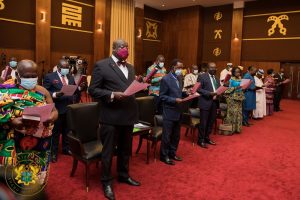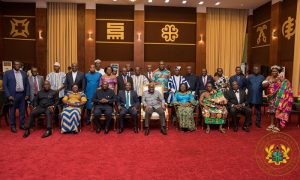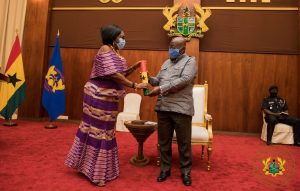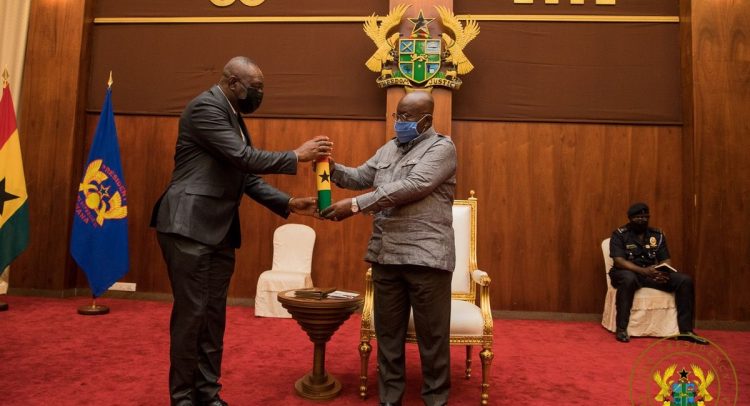President Akufo-Addo is worried about the several bottlenecks that have saddled the country’s land administration.
He said it is time to leverage on technology and all other means to change the narrative without delay to ensure accelerated development.
He has, therefore, charged the newly constituted twenty-five (25) member Lands Commission Board to do everything possible to change the current negative course of land administration in the country.
Swearing in members of the board at Jubilee House in Accra on Wednesday evening, President Akufo-Addo said the chaos in land administration had persisted for too long.
He said regrettably that despite “the various intervention by successive governments, most of the challenges in our land administration still persist, including dishonest sale of lands, poor record keeping at the commission, encroachment of public lands, and the fraudulent registration of lands.”
“Why should the same parcel of land be registered in the names of different people when the same Lands Commission is responsible for registration? Why should documents or files submitted to the Lands Commission mysteriously disappear when the Lands Commission ought to be the chief custodian of such important documents? Why should it take years to register just a plot of land?” he queried, adding “Our quest to transform our economy to bring about the much needed development and prosperity cannot be achieved without effective land administration.”
He said the chaos in the land administration sector discourages investors from coming into the country.

The President tasked the new board to prioritise the digitisation of the operations of the Lands Commission, believing it is the fastest route to achieve the much needed reforms.
“As you take office, one of the things you must pursue aggressively is the digitisation of the records of the Lands Commission. Most of the reforms needed to build an efficient land administration may be within our reach if we are about to move away from manual registration to digital registration. You must therefore work assiduously to ensure that the digitisation programme works. Our target is to ensure that the registration takes a maximum of one month and I dare say, the Ghanaian people will assess the success of your tenure by how far this objective is attained,” he said.
On his part, Chairman of the Commission, lawyer Alex Nii Kweite Quaynor, assured the President that they would improve land administration to ensure accelerated development.

“The word that will guide the Lands Commission Board during its term is ‘reform’. The reform requires changes at various levels of the operations of the Commission. Members of the Board of the Commission sworn into office this evening have the knowledge and expertise required to carry out the planned reforms and are committed to doing so satisfactorily,” he said.
The Lands Commission was established by Article 258 of the 1992 Constitution and the Lands Commission Act, 2008 (Act 767) as a body corporate with perpetual succession, a common seal and may sue and be sued in its corporate name.
The current Lands Commission, as part of the public sector reform programme and the land administration project, has been substantially remodeled by Act 767 to increase its efficiency and effectiveness.
The divisions of the Lands Commission under the Act are the Survey and Mapping Division, the Land Valuation Division, the Land Registration Division and the Public and Vested Land.

Board Members
Other members of the board include James Ebenezer Dadson, the Executive Secretary of the Commission; Daasebre Osei Bonsu II, National House of Chiefs; Anthony Forson, Jnr., President of the Ghana Bar Association; Jonathan Allotey Abbosey, Ghana Institution of Surveyors; Mrs. Ama Kudom Agyeman, Bono East Region; Dr. Prosper Basommi Laari, North East Region; Alhaji Mohammed Abdul-Haq, Upper West Region; Ms. Yvonne Adoley Sowah, Greater Accra Region; Mr. Kofi Dankwa Osei, Eastern Region; Mama Dzidoasi I, Volta Region; Nana Obonbo Sewura Lupuwura II, Oti Region and Kwame Kwaasi Danso, Central Region.
The rest are Dr. Isaac Obirim Kofi Sagoe, Western Region; Samuel Kofi Abiaw, Western North Region; Nana Nsuase Poku-Agyemang III, Ashanti Region; Nicholas Lenin Anane-Agyei, Ahafo Region; Isaac Kwadwo Amankwah, Bono Region; Dubik Yakubu Mahama, Northern Region; Dr. Alhaji Adams Sulemana, Savannah Region; Jonathan Anaboro Angme, Upper East Region; Dr. Kwadwo Yeboah, Land Use & Spatial Planning Authority; Rev. Kwadwo Nkrumah, National Association of Farmers & Fishermen; Henry Kwabena Kokofu, Environmental Protection Agency, and Benito Owusu-Bio, MP, Ministry of Lands and Natural Resources.
By Charles Takyi-Boadu


